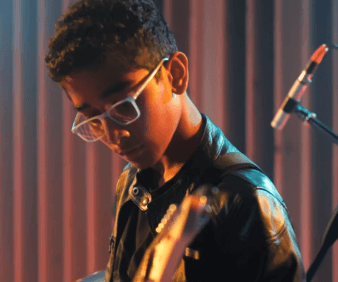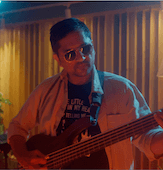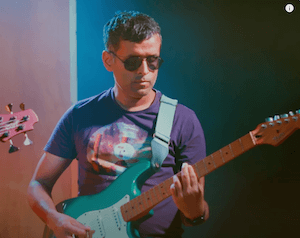
We specialize in
All age groups
Bands looking to be more industry ready
Late beginner to advanced students
Music students pursuing contemporary courses
Self-taught musicians/ students
Music students pursuing grade exams
This course is for. . .

Band Camp is for musicians, music students, and emerging bands looking to gain real-world studio experience. Whether self-taught, formally trained, or part of a group, this program provides the tools and guidance to take your music to the next level
Your Camp Roadmap
WEEK 1 - 3
Orientation & Band meets
Students receive clear guidelines, assigned parts, and tailored learning materials such as transcripts and video tutorials. Individual parts are carefully refined to ensure every member is fully prepared to perform.
WEEK 4 - 6
Rehearsals focus on refining the song arrangement and enhancing group dynamics. Students work under expert guidance to prepare for recording and performance.
Rehearsals (Jams)
Rehearsals & audio recording sessions
These sessions, offering students their first real exposure to the recording process. They learn the finer details of delivering precise takes and gain a deeper understanding of studio workflows
WEEK 7 - 8
WEEK 9
Final rehearsals & review
Students refine their performance, focusing on cohesion and accuracy. Feedback is incorporated to finalise the arrangement.
Music video shoot
Students perform on a professional video set, capturing their best work. The focus is to highlight artistry and collaboration.
WEEK 10
Post production
This process involves 50+ hours of meticulous work, where expert engineers handle mixing, mastering, and editing. Both audio and video are brought to a high-quality final product that captures the magic our students’ performances.
It doesn't stop here...
Band Camp Highlights

Structured Rehearsals and Band Meetings
Rehearsals and band meetings are led by educators with extensive industry expertise. Students take part in jam sessions, band meetings, and Q&A discussions, while accessing resources like transcripts and video tutorials to refine their parts. Each session is meticulously designed to enhance performance quality and elevate students to industry-ready standards.

Professional Audio Recording Experience
Students step into a professional studio, often for the first time, for a transformative experience. This involves recording their parts independently or collaboratively under the guidance of sound engineers and ensemble coordinators. They gain first-hand knowledge of recording workflows, session dynamics, and studio professionalism, building confidence and expertise for future industry opportunities.

Unmatched Facilities for Music Students
At Trill Route, students have access to a professional-grade recording studio and a live room acoustically designed to replicate real performance environments. Our studio features world-class equipment, ensuring an authentic and unparalleled sound. This industry-standard infrastructure provides music students with the ultimate creative space

Live Music Video: A lasting impression
Students star in a fully produced live music video, created with a dedicated team to capture their best performance. This production goes beyond a certificate, serving as a standout addition to any music portfolio as a visual record of their growing musicianship.

Showcasing on Social Platforms
The final music video is exclusively shared on our social platforms, providing students with a professional platform to showcase their talent to a wider audience. This highlights their musical journey and serves as a valuable addition to their public profile.
Course details

Join Band Camp.
Get the opportunity to work on projects and learn from experienced music producers.
10 weeks learning
Training led by experts
Rehearsals & Band meets
Audio recording experience
Access to our studio space
Your takeaways
Live Music Video
A professionally produced live performance video for your portfolio.
Certificate of completion
Official recognition of hands-on experience and successful course completion.
Transcripts & learning resources
Access learning resources anytime, anywhere, for a year.

We specialize in
Submit your audition video
Upload a recording showcasing your skills, style, and musicality. This helps us understand your level and place you in the right band for the program.
Audition Guidelines
Length
1 minute of uninterrupted playing/ singing.
Content
Perform a song that best showcases your skill level.
Solo or group
Individuals should submit a solo recording and bands a group performance.
Format
Clear audio & video recording in MP4/ MOV format.
Testimonials

Richie Samson
Father of Nephrita Gabriela Daffodil
Our daughter has been attending Western Vocals classes at Trill Route for the past 2.5 years, and the transformation in her skills has been remarkable. Under the dedicated guidance of her instructors, she has not only improved her vocal techniques but has also gained immense confidence in performing on stage.
Trill Route has provided her with numerous opportunities to showcase her talent through various stage performances (Intramurals) and Band Camp. These experiences have been invaluable in honing her skills and boosting her stage presence.
Additionally, the center's comprehensive training helped her achieve distinction in two grades from the prestigious Trinity College of Music. The structured coaching and the supportive environment at Trill Route played a significant role in her success.
We highly recommend Trill Route for parents looking to cultivate their children's musical talents.
The professional and nurturing atmosphere makes it an ideal place for young musicians to thrive.


Swetha Chandrasekaran
Mother of Skanda Kashyap
My son has been learning guitar at Trill Route for almost a year now. We had a great experience with Band Camp - it’s where the kids get to play in a rock band and have a full studio recording experience. They get to jam together, play different songs - really cool for those who want to play in a band but don’t know where to begin.
We like trill route so far- . Staff and faculty are friendly, students get to learn the kind of music they like.
Definitely recommend!


Sousheel Rorie Paul
Band Camp Performer
I have been learning guitar for the last 1.5 years and it's been a very enriching experience and especially the band camp teaches more than just music. The instructors make sure that the learning experience is customised as per needs and capabilities



Preetham Kajekar
Band Camp Performer
"I'm not going to lie, my musical skills are...let's just say 'a work in progress,' definitely in the minor key. But thanks to Trill Route's Band Camp, I got to experience what it's like to be in a band! From choosing our song to learning our parts, jamming together, and recording in a real studio, it was an incredible experience. The staff were amazing – patient, encouraging, and they somehow managed to make us sound (almost) good. Highly recommend

Ramadoss Mohanraj
Father of Mithun R
My son is taking drums calls in Trill route from 2023, actually I can say it as 'Thrill Route' for him !!!! The classes are well-structured allowing to progress at his own pace. The 'Band Camp' they are conducting gives an unique experience and one should see the video output in youtube. What truly sets this class apart is the well-planned schedule, training and the incredible effort put into creating a video showcasing the students' progress.

Music Videos from our Bands




Contact
For any questions in association with Trill Route, you may reach us at:
Application deadline
Aug 24, 2025
New batch starts
Aug 31, 2025
Course Duration
10 weeks
Location





